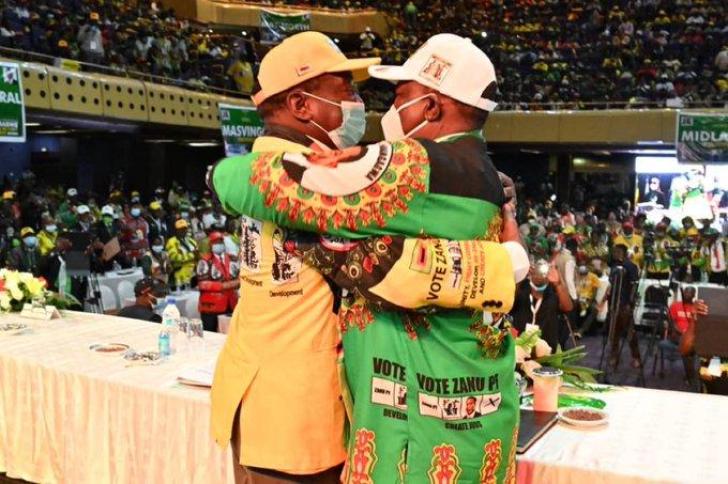Opinion / Columnist
Chiwenga's dilemma: The cost of loyalty in Zimbabwe's political chess
02 Apr 2025 at 17:01hrs |
0 Views

Vice-President Constantino Chiwenga's long-standing loyalty to President Emmerson Mnangagwa is now being met with ruthless betrayal. After playing a pivotal role in bringing Mnangagwa to power in 2017, enduring personal and political sacrifices, and standing by him through two contested elections, Chiwenga finds himself sidelined as his former ally maneuvers to extend his grip on power.
Mnangagwa's latest push to stay in office beyond 2028 has set the stage for an intense succession battle. Once thought to be the natural heir to Mnangagwa, Chiwenga is now facing an all-out campaign to block his rise. His allies are being purged, his influence is being diminished, and his role in Mnangagwa's administration is becoming increasingly symbolic.
This betrayal follows a familiar historical pattern. Leaders who seize power often eliminate those who helped them get there, fearing potential coups or challenges to their authority. From Napoleon's purging of his generals after the French Revolution to Stalin's ruthless elimination of rivals in the Soviet Union, political history is littered with examples of trusted allies being discarded when they are no longer useful. In Africa, figures like Idi Amin and Mobutu Sese Seko followed similar strategies, and even Robert Mugabe purged many of his loyalists when they became threats to his rule.
Mnangagwa is no exception. His dismissals of CIO Director-General Isaac Moyo, Police Commissioner-General Godwin Matanga, and Zimbabwe National Army commander Lieutenant-General Anselem Sanyatwe are part of a calculated effort to consolidate power and eliminate any potential threats. The removal of Sanyatwe, a key player in the 2017 coup, is particularly telling - Mnangagwa is neutralizing Chiwenga's military support base.
Chiwenga, for all his loyalty, has given far more than he has received. He secured Mnangagwa's return from exile, led the military intervention that toppled Mugabe, and stood by him as he solidified his rule. Yet, Mnangagwa has ensured that Chiwenga remains in check. Initially granting him significant power as Vice-President and Minister of Defence, Mnangagwa gradually weakened his authority, limiting his control over the military and government operations.
Despite his visible frustration, Chiwenga now faces a difficult decision. He can either challenge Mnangagwa openly, risking his political career and personal safety, or continue to endure the slow erosion of his power. Mugabe once warned him of this fate, and now that prophecy is playing out in real-time.
The question remains: will Chiwenga accept his diminished role, or will he take decisive action? With Mnangagwa tightening his grip on power and ensuring "anyone but Chiwenga" as his successor, the Vice-President may soon find that he has little choice but to fight back—or be pushed into political oblivion.
Mnangagwa's latest push to stay in office beyond 2028 has set the stage for an intense succession battle. Once thought to be the natural heir to Mnangagwa, Chiwenga is now facing an all-out campaign to block his rise. His allies are being purged, his influence is being diminished, and his role in Mnangagwa's administration is becoming increasingly symbolic.
This betrayal follows a familiar historical pattern. Leaders who seize power often eliminate those who helped them get there, fearing potential coups or challenges to their authority. From Napoleon's purging of his generals after the French Revolution to Stalin's ruthless elimination of rivals in the Soviet Union, political history is littered with examples of trusted allies being discarded when they are no longer useful. In Africa, figures like Idi Amin and Mobutu Sese Seko followed similar strategies, and even Robert Mugabe purged many of his loyalists when they became threats to his rule.
Mnangagwa is no exception. His dismissals of CIO Director-General Isaac Moyo, Police Commissioner-General Godwin Matanga, and Zimbabwe National Army commander Lieutenant-General Anselem Sanyatwe are part of a calculated effort to consolidate power and eliminate any potential threats. The removal of Sanyatwe, a key player in the 2017 coup, is particularly telling - Mnangagwa is neutralizing Chiwenga's military support base.
Chiwenga, for all his loyalty, has given far more than he has received. He secured Mnangagwa's return from exile, led the military intervention that toppled Mugabe, and stood by him as he solidified his rule. Yet, Mnangagwa has ensured that Chiwenga remains in check. Initially granting him significant power as Vice-President and Minister of Defence, Mnangagwa gradually weakened his authority, limiting his control over the military and government operations.
Despite his visible frustration, Chiwenga now faces a difficult decision. He can either challenge Mnangagwa openly, risking his political career and personal safety, or continue to endure the slow erosion of his power. Mugabe once warned him of this fate, and now that prophecy is playing out in real-time.
The question remains: will Chiwenga accept his diminished role, or will he take decisive action? With Mnangagwa tightening his grip on power and ensuring "anyone but Chiwenga" as his successor, the Vice-President may soon find that he has little choice but to fight back—or be pushed into political oblivion.
Source - online
All articles and letters published on Bulawayo24 have been independently written by members of Bulawayo24's community. The views of users published on Bulawayo24 are therefore their own and do not necessarily represent the views of Bulawayo24. Bulawayo24 editors also reserve the right to edit or delete any and all comments received.
Join the discussion
Loading comments…








































